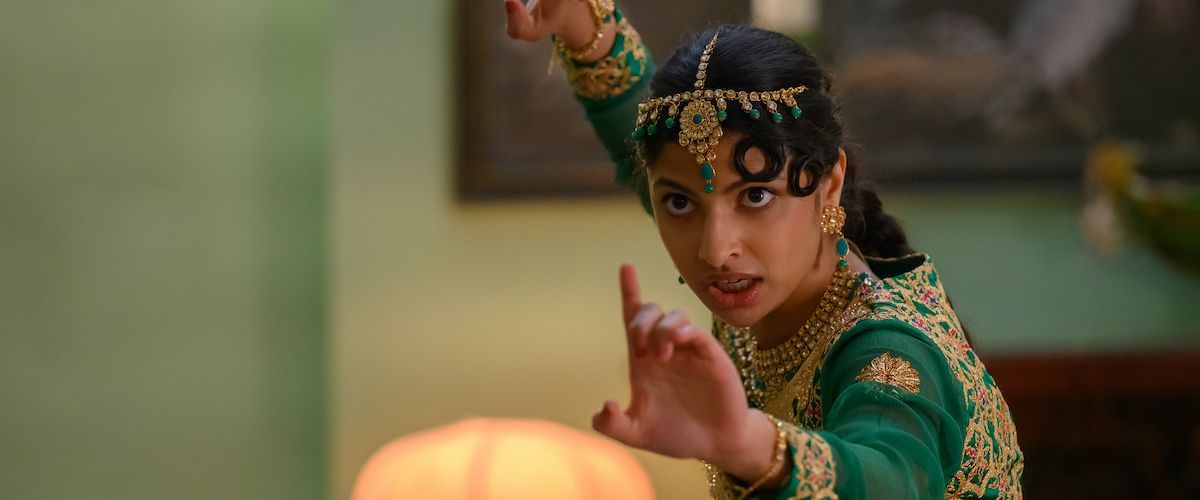Jonah Naplan April 30, 2023
At first glance, British television writer Nida Manzoor’s directorial debut “Polite Society” is mainly a film about two Pakistani sisters, one of them an aspiring artist, the other an aspiring stuntwoman. But on a deeper level, once you see the film, you realize the greater depths in which the movie explores cultural, social, and gender expectations all within the backdrop of a modern-day London. This is a riotous, highly imaginative, action-packed, and quick-witted film, that is more than intent on defying categorization. It wants to shake you to the core as it delivers societal commentary in between the high kicks and punches.
Structured like an Edgar Wright film, and reminiscent of Gurinder Chadha’s “Bend It Like Beckham,” “Polite Society” is split into five chapters as we follow a high school age Ria Khan (Priya Kansara) who dreams of becoming a stuntwoman and has begun sending emails to her idol asking for advice and whether or not they could ever meet someday. Her older sister, Lena (Ritu Arya), is an estranged artist who spends most of her days lying lazily in bed. But her relationship with her sister is close-knit; she helps Ria hone her fighting skills and films all of her videos for her YouTube channel. Ria spends a good deal of time with her best friends Clara (Seraphina Beh) and Alba (Ella Bruccoleri), and often ends up getting into school fights. Her life is filled with action. In a whimsy series of events, Ria and the Khan family get invited to a party at the residence of the uber-wealthy Shah ménage, where Lena gets swept up into a romance with Salim (Akshay Khanna), a dapper young man actively looking for a suitor.
Salim and his mother Raheela (Nimra Bucha) immediately smell fishy to Ria, and once Salim frequents more visits with Lena, eventually leading to the inevitable popping of a big question, Ria starts to investigate more into this mysterious family’s dynasty. She makes connections in her head, concluding that this family is relentlessly evil, and that there’s something much more sinister at play here. Spoiler alert: she turns out to be correct.
Manzoor, also working as the screenwriter of “Polite Society,” crafts a narrative that is incredibly charming in the sense that we’re following high schoolers who’re as ambitious as high schoolers can get. Ria, for one, is so, so, so sure about her theory on the Shah family, and is played with such exuberance that it becomes infectious pretty quickly. I bought into her relationship with Lena, yet I had trouble suspending my disbelief in the film’s overabundance of cartoonish action—think “Crouching Tiger, Hidden Dragon” if more blood was drawn, and if it was compiled by modern-day editing. Yet this over-the-top style of fighting is not consistent. It’s mixed with more grounded martial-art-esque hand-to-hand combat that’s not so much jumping and floating until kicking the enemy in the face, as it is throwing people into breakable objects, and crashing through doors.
There’s a great deal of this type of exertion in the film’s clumsy third act, yet not so much that it becomes overbearing. Editor Robbie Morrison and costume designer PC Williams, who previously worked with Manzoor in the series “We Are Lady Parts,” assist the director in ensuring that the world around Ria is immaculate. The film is shot with striking flashes of green, red, and gold by cinematographer Ashley Connor, and the wedding scene in particular is a marvelous setpiece.
The film is edited like an Edgar Wright movie. Title cards and chapter markers smash onto the screen in bright yellow, all-caps lettering. “Polite Society” is a loud movie, but also in the sense that it acts as a vibrant female empowerment picture. As the plot unravels itself (in some bizarre ways, to be sure), we realize that Raheela only sees young women as vessels in which to plant her next offspring. Ria and Lena find themselves caught up into a vicious trap, seemingly unable to escape from this existential wealth and power of a family they’ve only found themselves entangled with in the last month—Ria notes that much like a Jane Austen novel, Lena has immediately decided on her suitor and will wed him after only four weeks of making his acquaintance.
But unlike the stories taking place in the early 1800’s, “Polite Society” is very much a film of the now. It is not just a roaring wire-fu action flick. It is a parable about female empowerment, and the freedoms women deserve to steer their life as they choose. Ria, for one, is enamored with the idea of stunts and fighting, a generally masculine career. She is not just pursuing to defy generational and cultural norms—she is following through with her mission. Ria is a protagonist that reminds me of Jackie Chan. She frames her narrative with a sincere poise and buoyancy. “Polite Society” challenges you to keep up.
Now playing in theaters.

